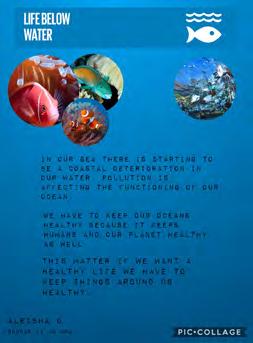
2 minute read
Domain - Humanities
The Humanities Domain continued to deliver thoughtprovoking learning with a continued focus on developing students’ critical thinking skills in 2020. All staff have worked collaboratively to engage students in the various branches of cultural learning that is, the Humanities. Curriculum was developed with the focus of every student being able to shine during the year.
The Year 7 students began their Secondary school humanities journey by exploring and understanding the importance of historical events and the significance of these events both locally and globally on their lives and how fitting and significant the Year 2020 will be on their lives, something to remember for a lifetime!
The Year 8 students were not going to miss out on the annual medieval activities usually provided by external facilitators (music and dance, games, early medieval warfare and costume and lifestyle). Thanks to the extremely dedicated and creative Year 8 Humanities teaching team students participated in a medieval zoom incursion day where they baked Norman cakes and designed Eleanor of Aquitaine dresses, family crests’ and noble lady dresses. They also defended with home-made shields and swords, sling shots, jousting swords and protective fortresses and finally, they acted/entertained with violin, piano and Hamlet ensembles.
Year 9 students were ‘challenged’ as they were introduced to the world of Commerce. They explored their current skills and those required by future employers; they wrote a resume, learnt the difference between needs and wants and how choices need to be made and opportunity costs identified; they learnt the benefits of budgeting personally and for our economy. Additionally, they ‘communicated’ their understanding of the reasons for the existence of laws, the idea of rights and responsibilities, specific laws which affect them as a teenager and the role of the courts and powers of police. Year 10 students in the units: Culture Conflict and Change; Issues and Insights and Dollars and Sense have been given the tools to imagine the future as they explored, were confronted by, questioned and planted the seeds of change in their lifelong journey to understand and actively participate in the world around them.
Year 11 and 12 students were engaged in VCE subjects of Accounting, Business Management, History and Legal Studies. These subjects and teachers developed the skills for our future leaders to be creative, problem-solve, think critically, negotiate, work in teams, apply judgement and make decisions which will give them tools vital to successfully navigating the Fourth Industrial Revolution.
I wish to acknowledge the mammoth and extraordinary efforts this year of all Humanities teachers to plan, change and plan again lessons that helped our students develop a better understanding of the world around them, question what is happening and wonder what if?
Janine Callahan Humanities Domain Leader












